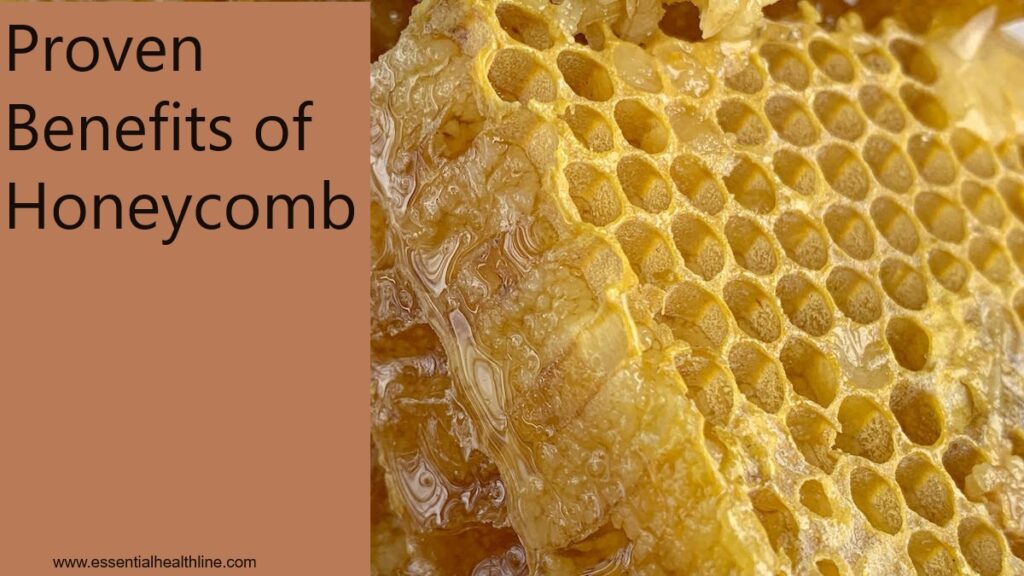Have you ever visited a farmer only to see him cut a medium-sized piece of honeycomb and put it in his mouth to eat? Did you, for a moment, wonder what are the health benefits of honeycomb?
First, honeycombs are hexagonal cells that honeybees build for storing honey. They also brood their young ones there.
Honeycomb is a natural sweetener with several health benefits, including boosting the immune system, heart, and liver health. Honeycomb is also used as chewing gum or a topping for your food. Still, you can use honeycomb as a tea sweetener.
However, honeycomb could cause various health risks when taken in large quantities. So, don’t eat the entire honeycomb!
This article will focus on the potential benefits of honeycomb, its nutritional value, and its risks.
Keep reading.
What Is Raw Honeycomb?: Potential Health Benefits of Honeycomb
The areas where honeybees brood their young ones are also their honey or pollen stores and are called honeycombs.
The honeycombs are made from beeswax containing raw (unprocessed) honey.
Though in small amounts, honeycomb, a natural product, also contains other bee products such as royal jelly, bee pollen, and propolis.
Also, since honeycomb contains antimicrobial and anti-inflammatory compounds, it can be used as a skincare ingredient.
Even so, most beekeepers eat the honey and the waxy cells. However, eating raw honeycomb has more health benefits than processed one.
Some potential health benefits of honeycombs include:
Promotes Heart Health
Honeycombs improve your heart health by regulating the heartbeat and preventing the death of healthy cells. It can also help lower blood pressure.
Since raw honeycomb contains propolis, it improves triglyceride. It can also lower cholesterol levels. Honeybees produce propolis, a resin, from sap-producing plants and trees. Honeycomb may also aid in protecting the heart against oxidative stress.
Lowers Inflammations
Honeycomb has anti-inflammatory properties that help in lowering infections. Besides, honeycomb increases the body’s ability to fight viruses, bacteria, and fungi.
Besides, the anti-inflammatory compounds found in honeycomb could help heal chronic ulcers and wounds.
Suppresses Coughs and Colds
Honeycomb is a great substitute for cough syrup. Not only does it suppress coughs and colds during cold seasons, but it also soothes the respiratory tract and sore throats.
The humectant found in the honey helps coat the throat and retain moisture, preventing dryness that could cause discomfort.
Improves Liver Function
The Beeswax extracts are rich in natural alcohols that have hepatoprotective qualities.
Consequently, honeycomb may aid in protecting your liver against damage.
In addition, beeswax could be essential for anyone with fatty liver disease.
Improved Sleep
Raw honeycomb is associated with better sleep because it increases the production of a melatonin hormone. It’s, therefore, a great choice for people struggling with insomnia and pregnant women.
Besides, since raw honeycomb reportedly has a low glycemic index, it is absorbed and digested slowly.
Improves Gut Health
Unprocessed honeycomb is a prebiotic which is great for the gut health. Prebiotics feed the gut microbiome, which further helps in nutrient retention and digestion.
Besides, the fiber and vitamins B and A in the raw honeycomb are essential for improving your gut health.
Boosts Immune System
Since honeycomb is rich in antifungal, antioxidants, and antibacterial properties, it boosts your immune system effectively.
Therefore, think of raw honeycomb if you’re looking for a sweet snack that can boost the body’s immune cells.
Can I Put Honeycomb In My Tea?
Yes, you can put honeycomb in your tea. Unlike other sugars, honeycomb is better because it doesn’t cause a spike in the glycemic index (GI). GI determines the effects of foods on your blood sugar levels.
Honeycomb has a GI of 33 to 55, whereas processed sweeteners, table sugar, and corn syrup have a GI of 110. Therefore, honeycomb is friendly to your health and is great for diabetes patients.
Like other sugars, honeycomb may also increase blood sugar levels; its antioxidants protect against type 2 diabetes and metabolic syndrome.
Besides, honeycomb may raise adiponectin levels. This hormone aids in the regulation of blood sugar, and it lowers inflammation.
Also, honeycomb is rich in vitamins C, E, A, D, B12, and B6, which lack processed sweeteners and white sugar. In addition, it is rich in calcium, magnesium, zinc, and iron.
Therefore, replacing other tea sweeteners with honeycomb is better and healthier.
However, seek medical advice before eating honeycomb.
What is the Benefit of Eating Honeycomb?
Honeycomb offers numerous health benefits to your body. For example, it improves liver and heart health, fights infections, and prevents coughs and colds. Besides, honeycomb is safer than other sweeteners as it is not high in glycemic index.
In addition, it boosts your gut health and makes you sleep better. Nevertheless, avoid eating a lot of honeycomb as it is still high in sugar, which could cause your blood levels to spike.
Which Is Better, Honey Or Honeycomb?
Since honeycomb is honey in its natural (unprocessed) form, both (honeycomb and liquid honey) have numerous health benefits. Even so, since whole honeycomb is rich in beeswax and fiber, it offers more health benefits than regular honey.
In addition, honeycomb is rich in vitamins, minerals, and small amounts of protein. It’s made of sugar (95-99%) and water. Also, since honeycomb hasn’t been processed, it is rich in enzymes, for example, glucose oxidase.
It’s also paramount to note that beeswax may help increase the anti-inflammatory benefits of honey.
How Do You Eat Raw Honeycomb?
If you have a piece of honeycomb and are wondering how to enjoy it, I’m here to help. There are different ways you can eat honeycomb.
Read on to learn.
Eat It Raw
You can eat raw honeycomb just as the beekeepers do. It feels like a piece of chewing gum with a natural sweetness that your body will love.
Mix With Your Favorite Beverage
You don’t need to do much. Just prepare your favorite beverage, for example, iced tea, and then add a piece of honeycomb to have a great sweet taste.
You can also increase the health benefits of lavender tea by mixing it with a piece of honeycomb.
Use It on Your Desserts or Salads
Adding healthy snacks to your dessert can be an effective way to keep diseases away. To get even more benefits from your desserts or salads, sprinkle grated golden beetroots on top of the honeycomb to make it crunchy and healthier.
Spread on the Toast
Instead of using processed peanut butter, commercial honey, strawberry jam, and others, honeycomb is a healthy alternative.
Better still, you can increase the health benefits of eggshells if you use them as a topping on the honeycomb.
Parting Shot
If you’re looking for the best healthy natural sugars to safeguard your overall health, think of natural honey.
Honeycomb is not only great for protecting you against upper respiratory tract infections, but it is also good for improving gut health, sleep, liver function, and heart health. Besides, honeycomb also keeps you in good health as it lowers inflammation.
So, next time, don’t go for artificial sweeteners. Think about the health benefits of honeycomb and go for it.



